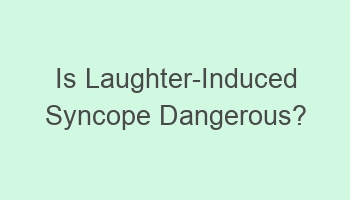Is Laughter-Induced Syncope Dangerous?

Is Laughter-Induced Syncope Dangerous? Yes, laughter-induced syncope can be dangerous. This condition, characterized by a sudden loss of consciousness triggered by laughter, is a rare but potentially serious phenomenon. While laughter is typically a harmless activity, for some individuals, it can lead to a drop in blood pressure and a temporary loss of consciousness. Understanding the potential risks of laughter-induced syncope is crucial for those affected by this condition. It is important to recognize the symptoms, such as dizziness or lightheadedness during laughter, and seek medical advice if necessary. By raising awareness and taking appropriate precautions, individuals can manage the risks associated with laughter-induced syncope effectively. Stay informed and prioritize your health when it comes to managing this condition.
Contents
| Laughter-induced syncope is a rare condition that causes fainting. |
| Laughing excessively can lead to a sudden drop in blood pressure. |
| Symptoms include dizziness, lightheadedness, and loss of consciousness. |
| It is important to seek medical advice if experiencing syncope episodes. |
| Cardiac issues can sometimes be the underlying cause of laughter-induced syncope. |
- Stay hydrated and avoid triggers to prevent syncope episodes.
- Consult a healthcare professional for proper diagnosis and treatment.
- Episodes can occur during intense laughter or emotional stress.
- Monitor blood pressure and heart rate regularly.
- Individuals with syncope may benefit from lifestyle changes and medication.
What Is Laughter-Induced Syncope?
Laughter-induced syncope is a rare condition where a person faints or loses consciousness due to intense laughter. It is a form of vasovagal syncope, which occurs when the body overreacts to certain triggers, causing a sudden drop in heart rate and blood pressure.
- Common Symptoms: Dizziness, lightheadedness, nausea, sweating, and a sudden loss of consciousness.
- Causes: It is often triggered by a sudden emotional response such as intense laughter, fear, or stress.
- Risk Factors: People with a history of fainting episodes, heart conditions, or anxiety disorders are more prone to laughter-induced syncope.
How Dangerous Is Laughter-Induced Syncope?
Laughter-induced syncope can be dangerous if it occurs in certain situations, such as when a person falls and injures themselves during a fainting episode. In most cases, however, it is considered relatively harmless and does not lead to long-term complications.
| Complications: | While rare, complications such as head injuries from falls or accidents during fainting episodes can occur. |
| Treatment: | Most cases of laughter-induced syncope do not require treatment, but lifestyle changes or medication may be recommended in severe cases. |
Can Laughter-Induced Syncope Be Prevented?
Preventing laughter-induced syncope</b involves avoiding triggers that can lead to fainting episodes. Learning relaxation techniques, staying hydrated, and avoiding situations that cause intense emotional responses can help prevent episodes of syncope.
- Trigger Avoidance: Avoid situations that lead to intense laughter or emotional responses.
- Stay Hydrated: Dehydration can increase the risk of fainting, so staying hydrated is important.
Is Laughter-Induced Syncope Hereditary?
Laughter-induced syncope</b is not necessarily hereditary, but certain factors that contribute to syncope, such as anxiety disorders or heart conditions, can have a genetic component. It is advisable for individuals with a family history of syncope to be aware of the potential risk factors.
| Genetic Factors: | While not directly inherited, certain genetic predispositions can increase the risk of syncope. |
| Family History: | Individuals with a family history of fainting episodes should be cautious and seek medical advice if necessary. |
When Should You Seek Medical Help for Laughter-Induced Syncope?
If you experience frequent episodes of laughter-induced syncope</b or if the fainting episodes are accompanied by concerning symptoms such as chest pain, palpitations, or difficulty breathing, it is important to seek medical help. A healthcare provider can evaluate your condition and recommend appropriate treatment options.
- Frequent Episodes: If fainting episodes occur frequently, medical evaluation is recommended.
- Accompanying Symptoms: Chest pain, palpitations, or difficulty breathing along with syncope require medical attention.